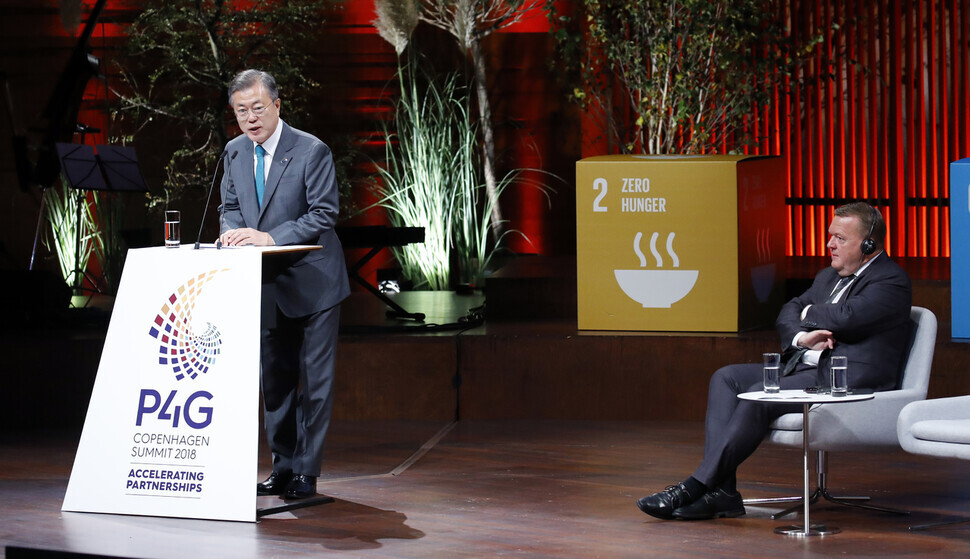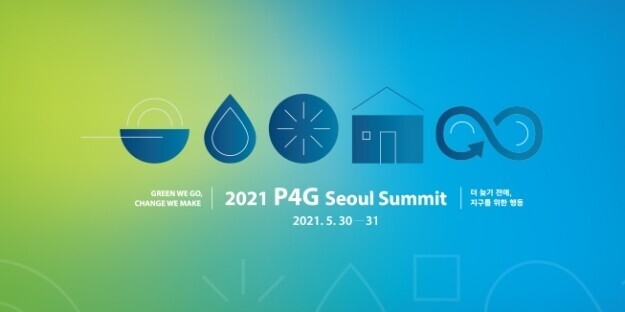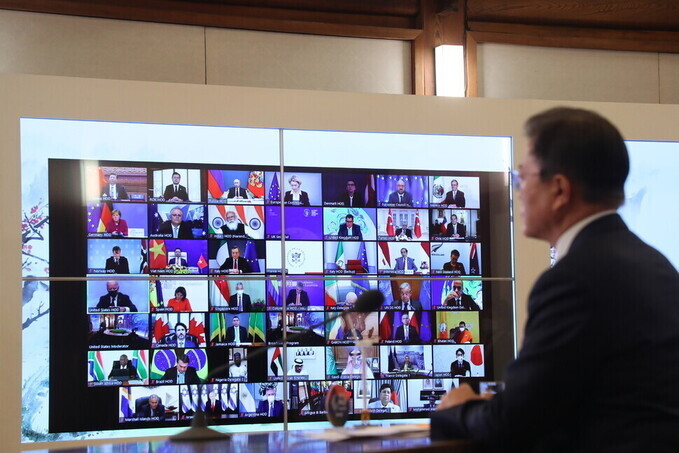hankyoreh
Links to other country sites 다른 나라 사이트 링크
P4G Seoul Summit to kick off Sunday

The 2021 Partnering for Green Growth and the Global Goals 2030 (P4G) Seoul Summit will begin Sunday.
The P4G Seoul Summit, which Seoul will host as a videoconference on Sunday and Monday, represents the second round in this year’s diplomatic wrangling over global climate change.
At the first round — the Leaders Summit on Climate, hosted by the US on April 22 —countries discussed their plans for cutting greenhouse gas emissions. At the P4G Seoul Summit, they will explore ways for the whole world to work together on sustainable development.
Since the latest summit is being held in South Korea, it gives the South Korean government a chance both to let the world know about its commitment to action on climate change and to expand its influence at the 26th UN Climate Change Conference (COP26), which the UK will be hosting in November.
That’s also why South Korea will be launching its Presidential Commission on Carbon Neutrality by 2050, which will coordinate the country’s efforts to implement carbon neutrality on Saturday, one day before the P4G Seoul Summit. The big question is whether the summit can help South Korea take on a leading role in cooperation on climate change.
Around 20 countries to participate; virtual attendance by Biden and JohnsonThe name “P4G” is short for “Partnering for Green Growth and the Global Goals 2030.” At its core, it is about international cooperation to achieve sustainable development in the climate crisis era. Because of this, it breaks with the format of focusing on the climate change response by advanced economies and includes large-scale representation from developing economies, international organizations and businesses.
Around 20 countries are expected to participate — more than the 12 that had been initially reported. Leaders will be meeting via videoconference from Asia (South Korea, Indonesia, Vietnam and Bangladesh), Europe (Denmark and the Netherlands), Central and South America (Mexico, Colombia and Chile), and Africa (Ethiopia, Kenya and South Africa).
Twenty-one international organizations are also set to participate, including the Green Climate Fund, the International Union for Conservation of Nature and the UN Environment Programme.
US President Joe Biden is also scheduled to take part via videoconference. In a joint press conference following his summit with Biden on Friday, South Korean President Moon Jae-in said, “Our two nations are already spearheading global cooperation in climate change response.”
“President Biden will participate in the P4G Seoul Summit next week virtually. I welcome his participation,” he added.
Also attending virtually will be Prime Minister Boris Johnson of the UK, the host country for the COP26 this November, along with former UK Secretary of State for Business, Energy and Industrial Strategy and current COP26 President Alok Sharma.
Focus on developing country cooperation; environment, industry and land ministries to participateThe focus of international cooperation at the meeting is on supporting developing countries. Equitable sharing of responsibility for climate change response between advanced and developing economies has been a longstanding issue.
The 2015 Paris Agreement stressed the importance of advanced economies spearheading efforts to support the climate change response in developing economies. Against this backdrop, the Seoul summit aims to identify climate change response solutions to provide to developing economies in five areas: food/agriculture, water, energy, cities and the circular economy.

As a reflection of this aim, the South Korean government is organizing separate sessions as host countries, with the Ministry of Environment (MOE), Ministry of Trade, Industry and Energy (MOTIE), Ministry of Land, Infrastructure and Transport (MOLIT), and Ministry of Agriculture, Food and Rural Affairs (MAFRA) presenting strategies for climate change response.
To begin with, the MOE will be sharing government plans for water management technology to overcome the climate crisis and for a transition to a zero-waste society.
The MOTIE will be sharing an approach to achieving carbon neutrality in the area of energy, while the MOLIT will be discussing strategies for reducing greenhouse gas emissions from cities, including public transportation and buildings.
The emphasis in the MOLIT session appears likely to be on the importance of information and communications technology in achieving carbon-neutral cities. The MAFRA will be identifying areas of cooperation toward achieving a transition to carbon neutrality in agriculture and developing sustainable farming and food systems.
S. Korea to share bigger climate goals?Another major focus of attention is whether the “Seoul Declaration” to be adopted on Monday will include bigger climate change response goals. The Seoul Declaration is expected to include references to international efforts to overcome the climate change crisis, practical steps to implement the Paris Agreement and achieve the Sustainable Development Goals, and communication with civil society, businesses and future generations.

After Moon failed to share an increased nationally determined contribution target for greenhouse gas emissions at the Leaders’ Summit on Climate last month, pressure has been growing for him to share a stronger response plan at the P4G Summit.
A Joint Statement following the South Korea-US Summit on Friday made reference to “the Republic of Korea’s plan to release early in October its provisional enhanced 2030 target and by COP 26 its final enhanced 2030 target, aligned with efforts to limit the global average temperature increase to 1.5 degrees Celsius and with the global goal to achieve net zero greenhouse gas emissions no later than 2050.”
In terms of reduction targets, South Korea is currently adhering to the aim of “24.4 percent reduction from 2017 levels by 2030,” which was set during the Park Geun-hye administration.
By Kim Min-je, staff reporter
Please direct comments or questions to [english@hani.co.kr]

Editorial・opinion
![[Editorial] Penalties for airing allegations against Korea’s first lady endanger free press [Editorial] Penalties for airing allegations against Korea’s first lady endanger free press](https://flexible.img.hani.co.kr/flexible/normal/500/300/imgdb/original/2024/0502/1817146398095106.jpg) [Editorial] Penalties for airing allegations against Korea’s first lady endanger free press
[Editorial] Penalties for airing allegations against Korea’s first lady endanger free press![[Editorial] Yoon must halt procurement of SM-3 interceptor missiles [Editorial] Yoon must halt procurement of SM-3 interceptor missiles](https://flexible.img.hani.co.kr/flexible/normal/500/300/imgdb/child/2024/0501/17145495551605_1717145495195344.jpg) [Editorial] Yoon must halt procurement of SM-3 interceptor missiles
[Editorial] Yoon must halt procurement of SM-3 interceptor missiles- [Guest essay] Maybe Korea’s rapid population decline is an opportunity, not a crisis
- [Column] Can Yoon steer diplomacy with Russia, China back on track?
- [Column] Season 2 of special prosecutor probe may be coming to Korea soon
- [Column] Park Geun-hye déjà vu in Yoon Suk-yeol
- [Editorial] New weight of N. Korea’s nuclear threats makes dialogue all the more urgent
- [Guest essay] The real reason Korea’s new right wants to dub Rhee a founding father
- [Column] ‘Choson’: Is it time we start referring to N. Korea in its own terms?
- [Editorial] Japan’s rewriting of history with Korea has gone too far
Most viewed articles
- 1[Editorial] Penalties for airing allegations against Korea’s first lady endanger free press
- 2Months and months of overdue wages are pushing migrant workers in Korea into debt
- 3In rejecting statute of limitations defense in massacre case, Korean court faces up to Vietnam War a
- 4Historic court ruling recognizes Korean state culpability for massacre in Vietnam
- 5“Those souls can rest now”: Vietnam massacre survivor reacts to Korean court win
- 6[Editorial] Verdict on Korea’s massacre in Vietnam a first step in atonement
- 7Ruling on Korean atrocity in Vietnam comes 23 years after Hankyoreh 21’s exposé
- 81 in 3 S. Korean security experts support nuclear armament, CSIS finds
- 9[Interview] Continuing the fight for victims of civilian massacres during Vietnam War
- 10Korea’s atrocities in Vietnam, in the words of those who saw and survived them